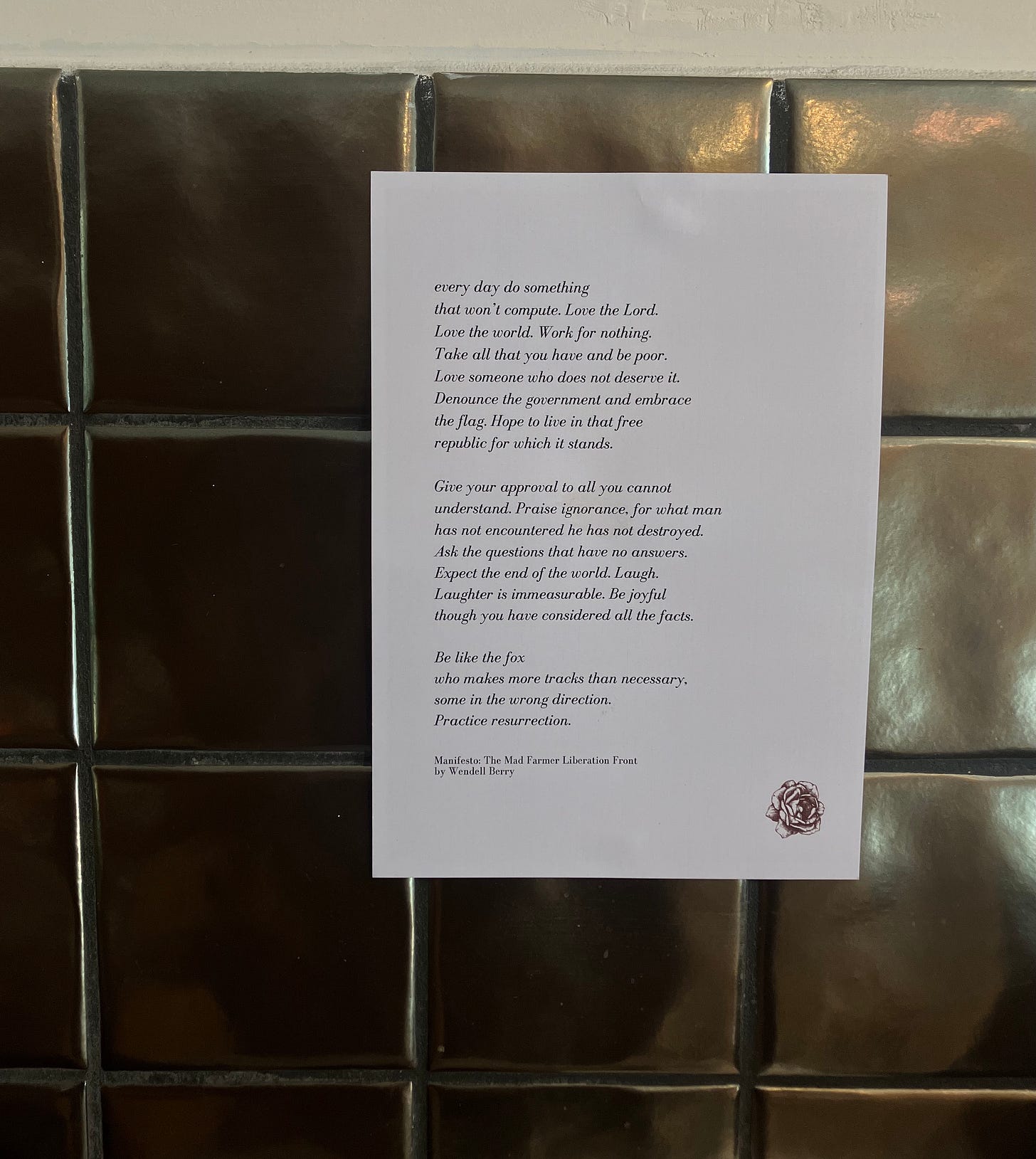Financial freedom my only hope / f*** living rich and dying broke
Jay Z
“No one can serve two masters. Either you will hate the one and love the other, or you will be devoted to the one and despise the other. You cannot serve both God and money”
Jesus of Nazareth
I am a greedy man. It is an insidious habit. I pine after a certain image. If I just had those shoes or jeans or that Garmin, then I’d be content and seen as an intelligent and spiritual person. I buy more books than I can read and feel a rush when I scroll or browse shelves to buy something new as if this shiny new object will finally unlock my wildest hopes and dreams.
True story, a few years ago I drove down to the Apple store and bought a brand-new iPad. I felt the rush of dopamine and adrenaline as I unboxed this beautiful piece of technology. Minutes later this rush fleeted, and I saw my reflection in the screen and realised I was trying to fill a longing with a freaking iPad.
Ten minutes later I was back at the Apple store returning it. The manager asked me “Is there anything wrong with it?” I said something along the lines of “No, it’s great. I bought it thinking it would make me happy, but it didn’t so I’m returning it.”
He looked at me perturbed then shrugged and I left.
I wish I could say that since that moment 3 years ago I’ve been liberated from the tyranny of greed and the idol of image. But there have been countless times since then that would prove otherwise. In all honesty, there are deep parts of my heart I’ve yet to surrender.
What’s that saying? If you want to see where your heart is show me your bank statement. Or as Jesus once said: “Where your treasure is your heart will be also1.”
All of this has been rumbling around in my brain and body as we’ve discussed generosity as a church. Specifically financial generosity.
Nothing Succeeds Like Success
You know the story of John Rockefeller, one of history’s wealthiest men, the story where a reporter asked – “how much money would it take for you to be content?” To which he responded “Just a little more.”
You got to give it to him, at least Rockefeller was honest. Many of us say we don’t struggle with greed, but our bank statements would reveal our hypocrisy. Yes, this is a sin in our hearts, but I also think this view of money is part of the cultural waters we swim in.
As psychiatrist Phil Stutz writes: “Our culture tells us daily that money is the bottom line of reality, the ultimate value in the universe2.”
In other words, there is a spiritual force or reality that animates the way we spend, see, and relate to money3.
Many of us tithe, sponsor a Compassion child, shout our friends coffee or lunch, and yet move through life with a core belief that money, or what money represents is security and success. Stutz continues:
Each time there is a financial transaction, there is flow. Think of flow as the dynamic force that drives everything. The very core of the universe is alive, ceaselessly creating new things. It is human nature to crave this ultimate reality.
Stutz uses “flow”, I use the Spirit of God that animates and moves us, creation, and history to an ultimately creative and redemptive end. And to be successfully human is to long and work toward this very end – to partner with God to bring beauty and justice and goodness to the world.
But money has become a substitute for this moving force, causing us to misunderstand the meaning of success. And “using money as a model of success is ripping our society apart”4.
Simplicity as an Act of Resistance
How do we recover our humanity in an ailing and covetous culture?
In his classic Celebration of Discipline, Richard Foster introduces us to the spiritual practice of simplicity.
Simplicity is a practice that helps cultivate an inward posture of believing in our guts that in Christ we have all that we need. The practice of bridging the gap between our disbelief and reality that God truly is radically, scandalously generous and that we need not fret about life. Simplicity is not flippant it is living out of the principle and ultimate reality that “The LORD is my shepherd, and I have all that I need5.”
As such, the practice of simplicity is a pathway to experiencing the good life. Which goes against the very grain of our society. Yet simplicity is “the only thing that sufficiently reorients our lives so that possessions can be genuinely enjoyed without destroying us6.”
Foster lays out ten helpful principles to get started with the Simple life, but I’ll share the three that I’m committing to:
1. Learn to enjoy things without owning them
Foster links the compulsive desire to own more things and the illusion of control. The idea is that if I own more things I have greater control over said area.
For me it’s books - I compulsively buy more to avoid the reality that I am afraid of facing the blank page every day, so I lie to myself and say “I need this new one then I’ll find the motivation.” So it’s time to whip back out my library card and rely on friends’ shelves.
2. Reject anything that is producing an addiction in you
Foster puts it simply: “Any of the media you find you cannot do without, get rid of….simplicity is freedom, not slavery. Refuse to be a slave to anything but God7.”
I suck at this! I need to get off Instagram and YouTube but I keep convincing myself it’s worth having, which ties into the next principle.
3. Refuse to be propagandised by the custodians of modern gadgetry
(I’m getting this sentence tattooed it’s so cool! Drop it in a conversation next time, I dare you.)
There are thousands of businesses pumping billions of dollars into stealing your time, energy and focus. And not to sound like a neo-Luddite but today, our time is being aggregated at warp speed to make crazy people inhumane sums of money8. So, we must soberly refuse to give into these games. Let’s make the words of Wendell Berry our manifesto for living:
When they want you to buy something
They will call you.
When they want you to die for profit they will let you know.
So, friends, every day do something that won’t compute.
Love the Lord. Love the world. Work for nothing.
Take all that you have and be poor9.
Simplicity is an act of resistance against the spirit of the age. Simplicity is a subversive and prophetic response to a system that clamours for us to live beyond our means and on a perpetual hamster wheel of more. It is a creative resistance against our emotional dependence upon impressing others and curating a fleeting facade. And finally, it is a courageous response to the force that is out to enslave and deface all beauty and humanity from our world.
Simplicity gets us started toward what theologians call our “cultural mandate.” That is, as stated earlier, rolling up our sleeves and getting in on the messy action of redeeming and restoring, breaking and blessing, and creating and giving.
Amassing money and things offers us a pseudo-humanity. We were made to rule and reign, to love and laugh and no money in the world could quench this thirst. “Real success is the aliveness you feel when you create something new,” and simplicity helps reconnect us to this aliveness10.
Today, right now, do something that won’t compute. Live simply, live deeply, sell your TV, don’t buy that pair of shoes, and get a library card.
Matthew 6:21.
Phil Stutz, Lessons for Living: What Only Adversity Can Teach You, (New York: Penguin Random House, 2023), 48.
The Biblical word for this is “mammon.” Mammon is the demonic force hellbent on enslaving humanity to corrupt creation. Author Andy Crouch writes: “Mammon is ultimately not at all just a thing, nor even a system, but a will at work in history. And what it wants above all, is to separate power from relationship, abundance from dependence, and being from personhood.” For a sober and helpful conversation see: Andy Crouch, The Life We’re Looking For: Reclaiming Relationship in a Technological World, (London: Hodder & Stoughton, 2022), 76.
Stutz, Lessons for Living, 48.
Psalms 23:1.
Richard Foster, Celebration of Discipline: The Path to Spiritual Growth, (London: Hodder & Stoughton, 2008), 105.
Foster, Celebration of Discipline, 111.
See: Morgan Housel, “A Brief History of Why the U.S. Consumer Thinks the Way They Do,” chapter 10, The Psychology of Money: Timeless Lessons on Wealth, greed, and Money, (Hampshire: Harriman House, 2020).
Wendell Berry, “Manifesto: The Mad Farmer Liberation Front,” in The Peace of Wild Things and other poems, (London: Penguin, 2018), 54.
Stutz, Lessons for Living, 49.



